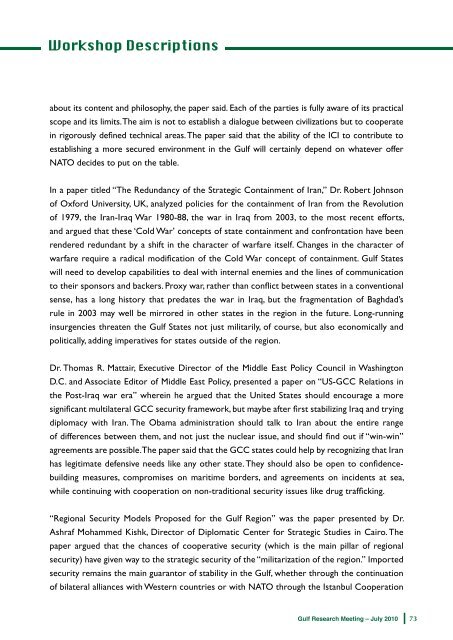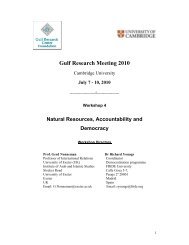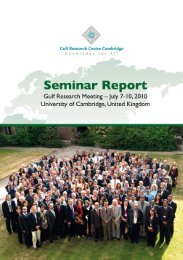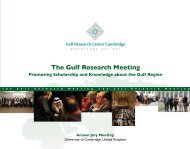GRM 2010 Report - Centre of Islamic Studies - University of ...
GRM 2010 Report - Centre of Islamic Studies - University of ...
GRM 2010 Report - Centre of Islamic Studies - University of ...
You also want an ePaper? Increase the reach of your titles
YUMPU automatically turns print PDFs into web optimized ePapers that Google loves.
about its content and philosophy, the paper said. Each <strong>of</strong> the parties is fully aware <strong>of</strong> its practical<br />
scope and its limits. The aim is not to establish a dialogue between civilizations but to cooperate<br />
in rigorously defined technical areas. The paper said that the ability <strong>of</strong> the ICI to contribute to<br />
establishing a more secured environment in the Gulf will certainly depend on whatever <strong>of</strong>fer<br />
NATO decides to put on the table.<br />
In a paper titled “The Redundancy <strong>of</strong> the Strategic Containment <strong>of</strong> Iran,” Dr. Robert Johnson<br />
<strong>of</strong> Oxford <strong>University</strong>, UK, analyzed policies for the containment <strong>of</strong> Iran from the Revolution<br />
<strong>of</strong> 1979, the Iran-Iraq War 1980-88, the war in Iraq from 2003, to the most recent efforts,<br />
and argued that these ‘Cold War’ concepts <strong>of</strong> state containment and confrontation have been<br />
rendered redundant by a shift in the character <strong>of</strong> warfare itself. Changes in the character <strong>of</strong><br />
warfare require a radical modification <strong>of</strong> the Cold War concept <strong>of</strong> containment. Gulf States<br />
will need to develop capabilities to deal with internal enemies and the lines <strong>of</strong> communication<br />
to their sponsors and backers. Proxy war, rather than conflict between states in a conventional<br />
sense, has a long history that predates the war in Iraq, but the fragmentation <strong>of</strong> Baghdad’s<br />
rule in 2003 may well be mirrored in other states in the region in the future. Long-running<br />
insurgencies threaten the Gulf States not just militarily, <strong>of</strong> course, but also economically and<br />
politically, adding imperatives for states outside <strong>of</strong> the region.<br />
Dr. Thomas R. Mattair, Executive Director <strong>of</strong> the Middle East Policy Council in Washington<br />
D.C. and Associate Editor <strong>of</strong> Middle East Policy, presented a paper on “US-GCC Relations in<br />
the Post-Iraq war era” wherein he argued that the United States should encourage a more<br />
significant multilateral GCC security framework, but maybe after first stabilizing Iraq and trying<br />
diplomacy with Iran. The Obama administration should talk to Iran about the entire range<br />
<strong>of</strong> differences between them, and not just the nuclear issue, and should find out if “win-win”<br />
agreements are possible. The paper said that the GCC states could help by recognizing that Iran<br />
has legitimate defensive needs like any other state. They should also be open to confidencebuilding<br />
measures, compromises on maritime borders, and agreements on incidents at sea,<br />
while continuing with cooperation on non-traditional security issues like drug trafficking.<br />
“Regional Security Models Proposed for the Gulf Region” was the paper presented by Dr.<br />
Ashraf Mohammed Kishk, Director <strong>of</strong> Diplomatic Center for Strategic <strong>Studies</strong> in Cairo. The<br />
paper argued that the chances <strong>of</strong> cooperative security (which is the main pillar <strong>of</strong> regional<br />
security) have given way to the strategic security <strong>of</strong> the “militarization <strong>of</strong> the region.” Imported<br />
security remains the main guarantor <strong>of</strong> stability in the Gulf, whether through the continuation<br />
<strong>of</strong> bilateral alliances with Western countries or with NATO through the Istanbul Cooperation<br />
Gulf Research Meeting – July <strong>2010</strong> 73





